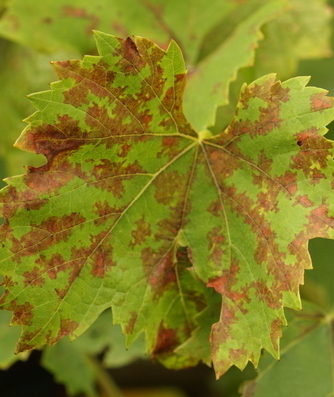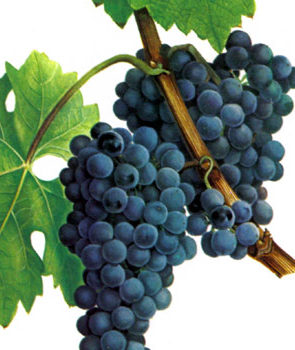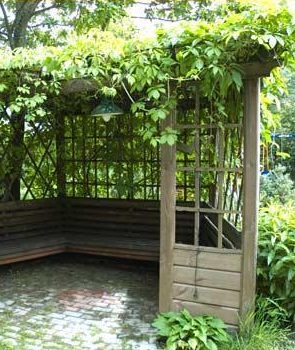Soda treatment of grapes
Content:
Experienced hobbyists and gardeners know that proper care is the key to a good harvest and plant health. Grapes are no exception to this rule. Care includes not only watering and weeding, but also the selection of means for the prevention and protection of diseases and insect pests. Soda is an excellent tool for these purposes, it allows you to reduce the use of chemicals and get ripe fruits clean and ecological. Therefore, soda treatment of grapes is a method that every gardener should know about.
Soda treatment of grapes: benefits for grapes
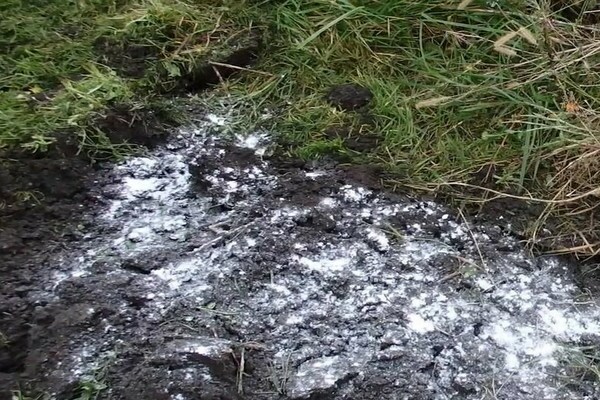
Baking soda is a carbonic acid salt. We will not be mistaken if we say that this is one of the types of salt. Namely, the acidic sodium salt of carbonic acid. Visually, these are small crystals. On sale it is presented in the form of a fine powder. When mixed with water, a slightly alkaline reaction occurs.
The fields of application of soda are very diverse: from cooking to medicine, from household use to caring for indoor plants, greenhouses and gardens. In this article, we are only interested in the field of gardening.
And here it is used for the prevention of diseases in young plants, protection and control of insect pests, preparation of seeds before soaking and further sowing, preparation of the soil for planting and its deoxidation.
In cases where salt is used to care for grapes, the following points can be highlighted:
- As a means of controlling such pests as powdery mildew and downy mildew, rot, fungal diseases.
- As a means of pest prevention.
- As an organic fertilizer.
- Reduces the amount of weeds.
- Makes the harvest richer and sweeter.
It is important to note, that the use of soda for the treatment of grapes will be effective for small lesions. In cases of mass infection, it is necessary to use strong chemical agents.
The use of soda for grapes has a huge plus in terms of harmlessness. It is absolutely safe for humans, pets and livestock, as well as for bees.
During the dilution and preparation of solutions of edible salt for grapes, you can be calm in terms of an overdose, it is almost impossible to do this. And if, nevertheless, this happened, then the correction to the correct proportions is very easy.
The use of baking soda for grapes is independent of the growing season. It is harmless and does not pose a threat to grapes even in the process of fruit ripening, unlike chemicals.
In gardening, soda ash is also used, but it must be diluted in warm water for better dissolution.
Processing grapes with baking soda for prevention and protection against diseases
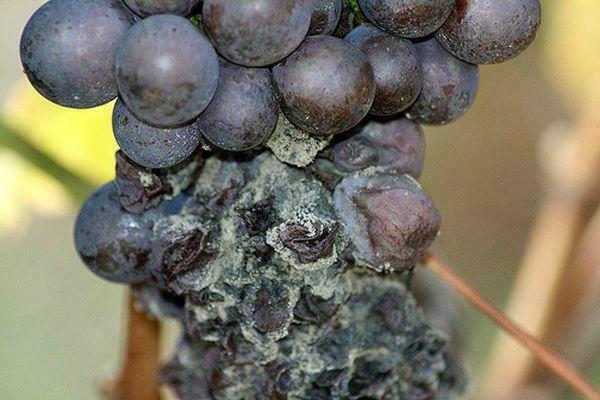
Grapes are a plant with low immunity to disease. In the central part of Russia, where climatic conditions have a pronounced change of seasons and climate, the most dangerous are fungal infections of the plant.
Powdery mildew takes the first place both in the damage done and in the methods of struggle. The best conditions for its growth are rainy and damp weather.
When damaged, berries and leaves are the first to suffer. Oidium covers them with a white powdery blanket, as a result of which the leaves around the perimeter dry out, curl up and change color to brown. When a vineyard is infected with powdery mildew, the gardener will feel a pronounced fishy smell, and the berries may gradually begin to rot and burst.
Powdery mildew easily tolerates cold weather and frost, so if you do not fight it, then with each new season the vineyard will become even more infected. To prevent the disease, the vineyard is sprayed with one of the following options:
- Dissolve one tablespoon of baking soda per liter of water. 200 ml of dishwashing detergent and 30 ml of sunflower oil are poured into the resulting solution. These components contribute to the stickiness of the solution for better "adhesion" to leaves and shoots. The finished composition is mixed well and the plants are sprayed into a spray bottle in dry weather without precipitation.
- Twenty grams of diluted soap solution (can be replaced with liquid soap) is diluted in 6 liters of water and 2 tablespoons of baking soda are added. The whole composition is thoroughly mixed and the grape bushes are processed.
Gray rot also belongs to fungal and damages almost the entire area of the plant to shoots, leaves, berries, but does not affect the root system. It grows with great speed. He "loves" berries very much with the consequences of insect activity or any other mechanical damage.
External indicators are a change in the color of the fruit to gray, which turns into brown. Then the berries are covered with bloom and shriveled.
If the infection by the fungus is not great, the plants are sprayed with a solution of baking soda of the following composition: 80 grams per 10 liters of water.
In case of global infection, the composition used in the fight against powdery mildew is perfect. It is necessary to dissolve two teaspoons of baking soda in a liter of water and mix with soapy water and vegetable oil.
Downy mildew characterized by the formation of whitish oily-transparent plaques on the sheets. On the reverse side, you can see the formed mycelium fluff. The lesion looks the same over the entire area of the plant. Infected inflorescences turn brown and eventually dry out, the fruits wrinkle.
The affected grapes are treated with a solution of the following recipe: 8-10 tablespoons of soda are dissolved in ten liters of warm water, 5 drops of iodine and 140 ml of sunflower oil are added. Adding soapy water, liquid soap, or dishwashing detergent is helpful.
Soap components are used to impart stickiness to the composition and its better adhesion to plant tissues.
An important point when using baking soda for grapes is that the desired disease-fighting effect will only be achieved in tandem with other planting care measures:
- Timely thinning of grapes for better air exchange.
- Fertilization with potassium and phosphorus, which help to increase immunity and strengthen the plant.
Insect pest protection
Along with fungal infections, the vineyard is threatened by caterpillars that devour the leaves of the plant. Caterpillars of pest butterflies inhabit the green leaves of the bush and feed on their juices, multiplying constantly and increasing the number of the parasite.
Gardeners with extensive experience and experience in growing grapes for processing use dry blended soda and flour in a 50/50 ratio (wheat flour is used). The ready-made composition is covered with a thin layer of integumentary foliage.
This method of processing grapes with soda gives very good results. But when applying it, be sure to control the acidity of the soil.
If the soil is at the maximum acidity level and it is better not to increase it, the grapes are treated with a different solution. 3 tablespoons of baking soda and 60 ml of dishwashing liquid are dissolved in ten liters of water.
The use of soda for grapes in the form of fertilizer
Sodium bicarbonate is used to fertilize soil with a humus content of 3-7%. It is used during autumn tillage. The prepared soil is treated with soda at the rate of 40 to 60 grams per square meter.
Replenishment of grapes.Soda containing a solution will have a positive effect on the quality of the future harvest. It will help to increase the sugar content of the berries, which will improve their taste. Experienced growers love to use this method.
Processing grapes with soda: recipes for solutions
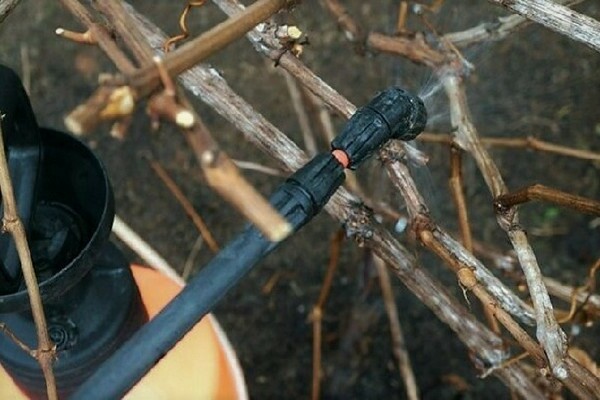
The composition and content of the components varies depending on the intended use. Weakly concentrated solutions are used as a grape reinforcement and disease prevention.
Naturally, formulations with a high concentration of soda are used for medicinal purposes and as a pest control agent. Note that in these solutions, besides soda, there are other components. Let's consider them in more detail.
Soda solution for grapes
The most commonly used treatment method is sprinkling soda on the grapes. And the most famous composition for this method: 30 grams of soda plus 30 ml of soap solution is mixed in 12 liters of water. A solution of this content is used to prevent and improve taste.
As a remedy, a more concentrated one is used. Solution: 30 grams of sodium bicarbonate is dissolved in five liters of water, 0.07 liters of sunflower oil and 6 tablespoons of hand-washing soap are added to them. Optionally, the component can be replaced with grated laundry soap.
The addition of soap-containing products creates a sticky structure, which in turn contributes to a longer fixation of the composition on the surface of the grapes.
Processing grapes with baking soda and iodine
Iodine together with baking soda increases the healing properties during processing. Such solutions are used to prevent the formation of fungal infections. Solutions with iodine for grapes are used in any period of growth and development, including ripening of fruits, without harming the plant.
The composition of the solution for processing soda for grapes is as follows: 1 liter of water + 30 grams of baking soda + 24 drops of iodine.
Processing with such a solution of salt for grapes is performed in the spring. This method reduces the possibility of infection during high humidity with powdery mildew and gray mold.
As you know, iodine has a disinfecting effect and does not lose it in the composition with soda. In addition, it has a beneficial effect on the future harvest by acting fortifying.
Combined with ammonia
Ammonium alcohol together with soda, however, as well as without it, is not toxic and does not contain substances harmful to plants and humans. Diluted in an appropriate amount in water, it provides excellent protection against insect pests.
A solution of ammonia is used to feed young plants to increase the green mass and its color saturation.
With a solution of soda and ammonia, grapes are treated against aphids, bear caterpillars and ants. The composition of the ready-to-use product: one teaspoon of baking soda, 10 ml of ammonia and one teaspoon of magnesium sulfate per 10 liters of water. In addition, this solution is very nutritious for young plants.
Potassium permanganate and soda for grapes
Solutions with potassium permanganate are used for the following purposes:
- as an auxiliary agent to the main agent in the fight against plants affected by gray mold and powdery mildew.
- for preparatory processing of seedlings before planting in the main place. This method protects young grapes from pest damage.
- fertilization of soil and plants. For this, potassium permanganate is mixed with boric acid.
Potassium permanganate solutions are used throughout the growing season, including ripening and forming of berries. Potassium permanganate is combined with a universal solution of soda.
Processing time
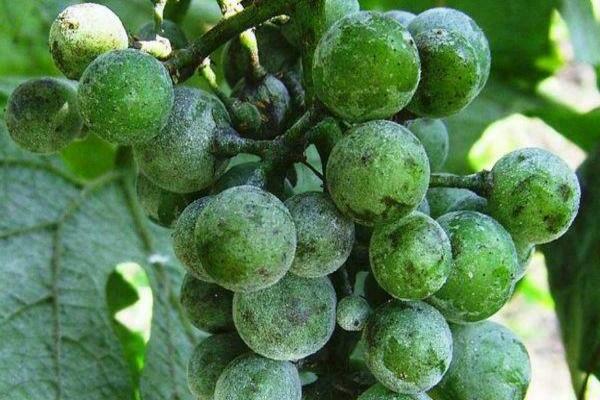
For the prevention of diseases, processing is performed regularly. To avoid fungal infections, spraying begins from mid-April and then five times from the moment of flowering.
Compulsory processing of soda grapes in June.It is during this period that ovaries are formed, and this is the main moment in the process of growth and development of grapes.
Spraying with a solution of soda for grapes is performed in cloudy, not rainy weather, since the sun's rays passing through the water can lead to burns. In case of lesions, the grapes are treated every seven days until cured.
Using homemade baking soda products gives you the ability to protect your grapes without the use of chemicals, get a healthy harvest, and protect and nourish your plants in environmentally friendly ways.
In addition, the berries will be sweet and juicy. All these benefits you get without major costs thanks to the well-known grape soda treatment.


